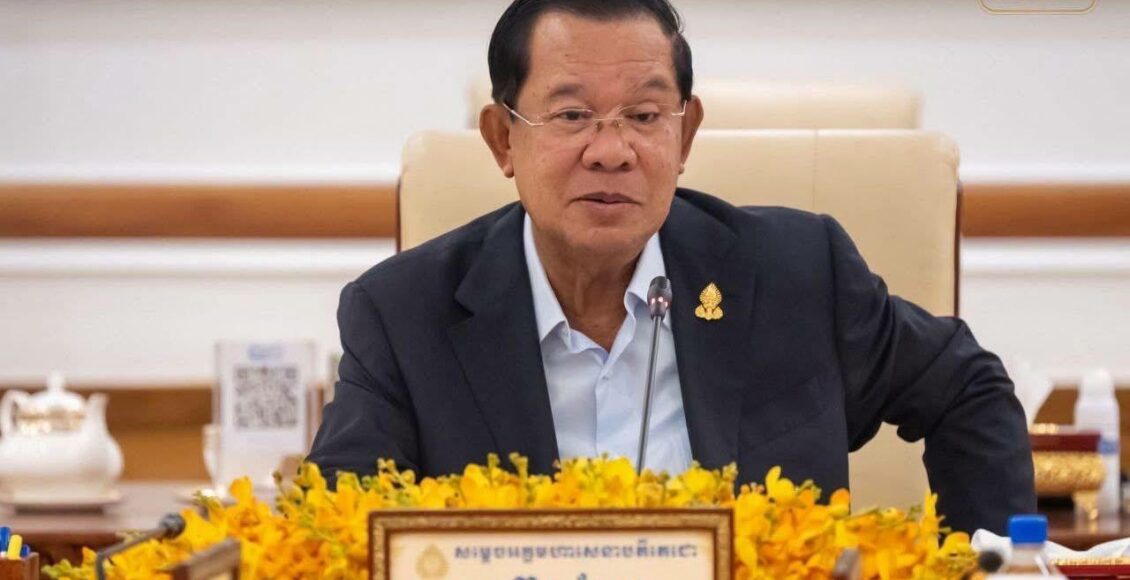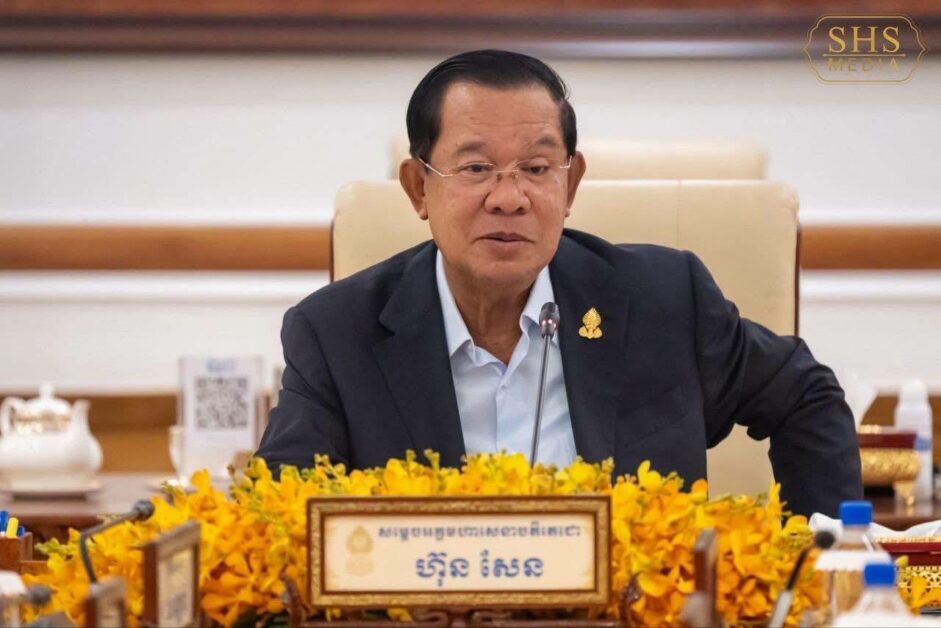សម្តេចតេជោ ហ៊ុន សែន៖តាំងពីក្រោយសេចក្តីថ្លែងការណ៍សន្កិភាពរវាងកម្ពុជា-ថៃ ត្រូវបានចុះហត្ថលេខារវាងនាយករដ្ឋមន្ត្រីកម្ពុជា និងនាយករដ្ឋមន្ត្រីថៃ ក្រោមការជួយរៀបចំរបស់ នាយករដ្ឋមន្ត្រីម៉ាឡេស៉ី ដែលជាប្រធានអាស៊ាន និងប្រធានាធិបតីសន្តិភាពរបស់អាមេរិក ដូណាល់ ត្រាំ

សម្តេចតេជោ ហ៊ុន សែន៖តាំងពីក្រោយសេចក្តីថ្លែងការណ៍សន្កិភាពរវាងកម្ពុជា-ថៃ ត្រូវបានចុះហត្ថលេខារវាងនាយករដ្ឋមន្ត្រីកម្ពុជា និងនាយករដ្ឋមន្ត្រីថៃ ក្រោមការជួយរៀបចំរបស់ នាយករដ្ឋមន្ត្រីម៉ាឡេស៉ី ដែលជាប្រធានអាស៊ាន និងប្រធានាធិបតីសន្តិភាពរបស់អាមេរិក ដូណាល់ ត្រាំ។
យើងពិនិត្យឃើញថា មានការរីកចម្រើនគួរឲ្យកត់សម្គាល់តាំងពីការប្រជុំ JBC.RBC រហូតដល់ការដកអាវុធធុនធ្ងន់ជំហានដំបូងចេញពីតំបន់ជម្លោះ ដោយមានការត្រួតពិនិត្យផ្ទៀងផ្ទាត់របស់ក្រុមសង្កេតការណ៍អាស៊ាន (AOT) ។ នេះជាដំណើរឆ្ពោះទៅរកការបញ្ចប់ ឬបន្ថយអរិយភាពរវាងប្រទេសទាំងពីរ ដែលយើងត្រូវចូលរួមអបអរសាទរ។
ជាមួយនឹងការសម្តែងការរីករាយ ខ្ញុំមានការចាំបាច់ជម្រាបជូនប្រជាជនកម្ពុជាកុំយល់ច្រឡំរឿងបើកច្រកព្រំដែនកម្ពុជាថៃឡើងវិញ ព្រោះមួយរយៈចុងក្រោយនេះ ថ្នាក់ដឹកនាំថៃមួយចំនួនបានយករឿងបើកច្រកព្រំដែនឡើងវិញនេះមកនិយាយយ៉ាងច្រើន ដែលប្រហែលក្លាយជាប្រធានបទសម្រាប់ឃោសនាបោះឆ្នោត នាពេលខាងមុខនៅថៃទៀតផង។
ការដែលថ្នាក់ដឹកនាំថៃរាប់ទាំងនាយករដ្ឋមន្ត្រីថៃផងនិយាយរឿងបើកច្រកព្រំដែនច្រើនបែបនេះ បង្កឲ្យមានការយល់ច្រឡំក្នុងចំណោមប្រជាជនកម្ពុជា ឬប្រជាជនថៃថា ភាគីកម្ពុជាជាអ្នកទៅសុំភាគីថៃឲ្យបើកច្រកឡើងវិញ។ ខ្ញុំពិតជាមិនចង់ឲ្យប្រជាជនកម្ពុជាទទួលទានដំណេកជាមួយការយល់ច្រឡំនោះទេ។ សម្រាប់ប្រជាជនថៃគឺជារឿងរបស់ថៃដែលអាចត្រូវបានបោកប្រាស់សម្រាប់ការបោះឆ្នោតនាពេលខាងមុខ ដែលការបើកច្រកព្រំដែនក្លាយជាប្រធានបទឃោសនាបោះឆ្នោតផងដែរ។
សម្រាប់ប្រជាជនកម្ពុជា ខ្ញុំសូមបញ្ជាក់ឡើងវិញថា តាំងពីថៃបិទច្រកទ្វារព្រំដែនជាឯកតោភាគីមក កម្ពុជាមិនដែលបានទៅសុំថៃឲ្យបើកច្រកឡើងវិញនោះទេ។
ថៃអាចបន្តបិទ១០០ឆ្នាំ ឬ៥០០ឆ្នាំទៀតក៏ជារឿងរបស់ថៃ ព្រោះកូនសោស្ថិតក្នុងដៃរបស់ថៃ។ ការបិទកន្លងមកនេះមិនធ្វើឲ្យកម្ពុជាស្លាប់នោះទេ តែផ្ទុយទៅវិញ
ធ្វើឲ្យទំនិញក្នុងស្រុកចូលមកជំនួសទំនិញថៃ ដែលនោះគឺជាឱកាសជម្រុញផលិតកម្មក្នុងស្រុកឲ្យកើនឡើង។
ខ្ញុំបាននិយាយប្រាប់ប្រតិភូមិត្តភក្តិបរទេសថា ថៃបិទច្រកព្រំដែនជាមួយកម្ពុជាមិនមែនគ្រាន់តែកាត់ផ្តាច់ការតភ្ជាប់រវាងកម្ពុជា-ថៃប៉ុណ្ណោះទេ តែជាការ
កាត់ផ្តាច់ការតភ្ជាប់អាស៊ាន និងអាស៉ីផងដែរ។ ឯណាទៅហាយវេអាស៊ាន ផ្លូវដែកអាស៊ាន និងហាយវេអាស៉ី?
សង្ឃឹមថាសារនេះនឹងបានទៅដល់ថ្នាក់នាំថៃ និងប្រជាជនថៃថា កម្ពុជាមិនទៅសុំថៃបើកច្រកព្រំដែនវិញទេ និងសង្ឃឹមថាប្រជាជនកម្ពុជាមិនយល់ច្រឡំថា ថ្នាក់ដឹកនាំកម្ពុជាធ្វើថោកទៅសុំថៃឲ្យបើកច្រកព្រំដែនវិញនោះដែរ៕
Since the signing of the Joint Statement between Cambodia and Thailand by the Prime Ministers of both countries, facilitated by the Malaysian Prime Minister in his capacity as ASEAN Chair and U.S. President Donald Trump as the Peace Envoy, we have observed notable progress. This includes the convening of the JBC and RBC meetings, as well as the initial withdrawal of heavy weaponry from the disputed area, under the supervision and verification of the ASEAN Observers Team (AOT). This marks a step toward ending or easing tensions between the two countries, a development we should all celebrate.
However, while expressing my appreciation, I find it necessary to inform the Cambodian people not to misunderstand the reopening of the Cambodia-Thailand border checkpoints. In recent times, some Thai leaders have repeatedly raised the topic of reopening the border, possibly turning it into a campaign issue for upcoming elections in Thailand.
The repeated remarks by Thai leadership, including the Prime Minister, regarding the reopening of border checkpoints have caused confusion among the Cambodian and Thai public, leading some to believe that Cambodia has requested Thailand to reopen the border.
I do not want the Cambodian people to go to bed with this misleading information. For the Thai public, it is an internal matter that may be exploited for election purposes, with the reopening of the border potentially being used as an election campaign topic.
To the Cambodian people, I wish to reiterate: ever since Thailand unilaterally closed the border, Cambodia has never asked Thailand to reopen it. If Thailand wants to keep it closed for another 100 or even 500 years, that is entirely their decision. After all, the key is in Thailand’s hands.
This closure has not led to Cambodia’s downfall; on the contrary, it has created opportunities. It has prompted an increase in domestic goods, replacing Thai products, thereby stimulating local production growth.





